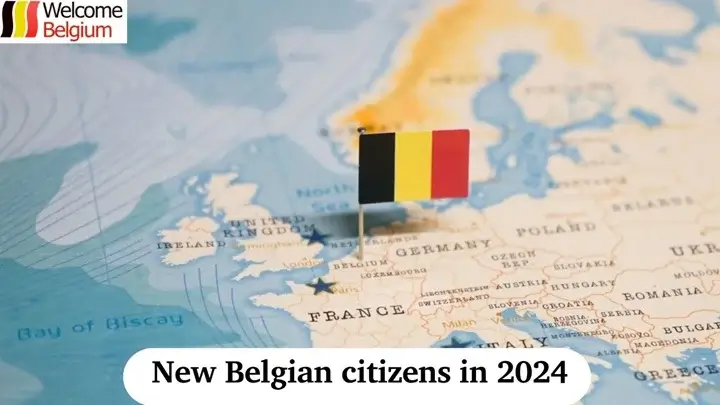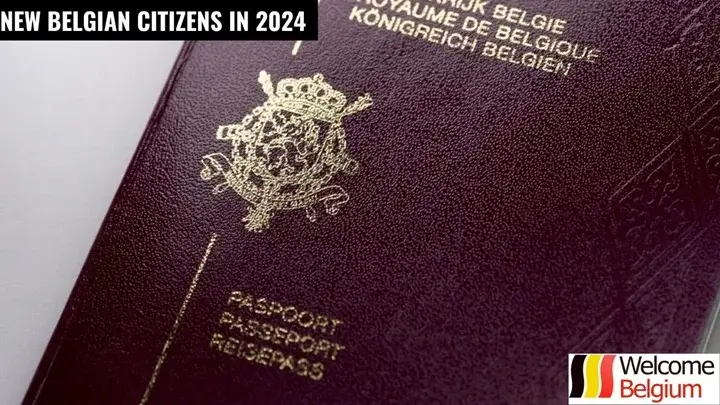In August 2024, Belgium granted citizenship to 4,048 foreigners, indicating a steady increase in the number of new citizens. This data, provided by the country’s statistical service, highlights the importance of migration policy and the process of obtaining citizenship in the country. The article examines the reasons for the increase in the number of citizens and the impact on social and economic aspects of Belgium.
Statistics and the reason for the growth
In 2024, the number of people who received Belgian citizenship increased, which is due to several key factors. This is primarily due to the improvement of migration policy, opportunities for integration and the increase in the number of foreign workers and professionals in need of official status. In recent years, there has also been an increase in the number of applications from citizens of countries experiencing economic or political crises. As a result of these changes, the number of citizenships granted continues to increase, which affects the social and economic structure of the country.
Statistics on obtaining citizenship with explanations:
- Number of new citizens: In August 2024, Belgium granted 4,048 citizenships, an increase compared to previous years. This is 10% more than in 2023.
- Increase in applications: The main driver of the increase is the increase in the number of people applying for citizenship, thanks to the simplification of some procedures, such as simplified processing for workers and students.
- Migration flows: Political instability in a number of countries and economic crises have contributed to a greater flow of migrants, many of whom seek Belgian citizenship as a form of security.
- Integration programs: Belgium has significantly expanded programs aimed at helping migrants integrate into society, which has contributed to increased interest in citizenship.
Given current trends, it is expected that in 2025 the number of people receiving Belgian citizenship will continue to grow. This is due to the improvement of migration policy, the increase in the number of jobs for foreigners and the general stability in the country. It is predicted that in the future, especially in connection with global migration processes, the number of new Belgian citizens will continue to increase, which will have an impact on the social structure and economy of the country.
Peculiarities of the process of obtaining citizenship in Belgium
The process of obtaining citizenship in Belgium in 2024 depends on a number of factors, including length of residence, language skills, and integration into society. The country offers several ways to obtain citizenship, both through naturalization and by birthright. However, there are a number of conditions that must be met in order to become a full-fledged Belgian citizen. In this section, we will take a closer look at the specifics of the citizenship process in Belgium.
List of features with detailed description:
- Residence requirements. To qualify for citizenship, a candidate must have legally resided in Belgium for at least 5 years. For spouses of Belgian citizens, this period is reduced to 3 years if they live together in marriage.
- Language skills. Applicants must demonstrate knowledge of one of Belgium’s official languages – French, Dutch or German. The required level varies by region, but is usually B1 on the Common European Framework of Reference for Languages.
- Integration into society. It is important to demonstrate active integration into Belgian society, including participation in the work process, social activity and compliance with local laws.
- Renunciation of previous citizenship. In some cases, Belgium requires the candidate to renounce the citizenship of his/her country. However, there are exceptions, especially for citizens of EU countries.
- Tax history: Applicants must demonstrate that they have fulfilled their tax obligations in Belgium in good faith. This is also an important factor for citizenship.
- Crimes and misdemeanors. Those with a criminal record or serious misdemeanors have a lower chance of obtaining citizenship. The history of law enforcement in Belgium is also taken into account.
- Naturalization: For those who do not meet the above requirements, naturalization is possible, but the process may be longer and require additional evidence of integration.
The process of obtaining citizenship in Belgium requires fulfilling a number of conditions, which may be a problem for some candidates. For example, language requirements and proof of tax compliance may be difficult for people who have only recently arrived in the country. In addition, renouncing previous citizenship and meeting strict residency requirements may be an obstacle for those wishing to obtain a Belgian passport.
Forecast for 2025
The forecasts for 2025 for obtaining citizenship in Belgium assume a steady increase in the number of new citizens. This is due to ongoing migration processes and changes in legislation aimed at simplifying the procedure for certain categories of migrants. The trend towards increasing citizenship is expected to continue next year, which will have significant socio-economic consequences for the country.
Forecast for 2025:
- Continued growth in the number of citizens. It is predicted that the number of new citizens in 2025 will increase by 5-10% compared to previous years. This is due to positive changes in migration policy and improved conditions for integration.
- Simplifying the process of obtaining citizenship for some categories of migrants. It is planned to expand the program for people who have lived in Belgium for more than 5 years, as well as for students and specialists in science and technology, which could significantly speed up the process.
- Increase in the number of citizens from EU and African countries. The largest groups receiving citizenship are projected to be citizens of the European Union and African countries, reflecting the demographic structure of migration flows.
- The role of family groups. Family groups and refugees will make up a significant proportion of new citizens. Easing the rules for migrant families will facilitate faster citizenship.
- Impact of policy decisions on migration. Changes in EU migration policy are expected to have a significant impact on the number of citizenship applications, particularly under free movement agreements and new immigration programmes.
Belgium will therefore continue to see an upward trend in the number of new citizens in 2025, thanks to well-thought-out reforms in the migration sphere. This will have a significant impact on the country’s social structure and economy, especially in terms of the integration of migrants into the labour market and cultural life.





